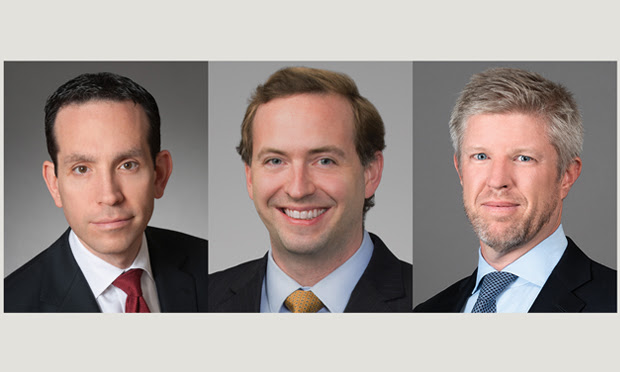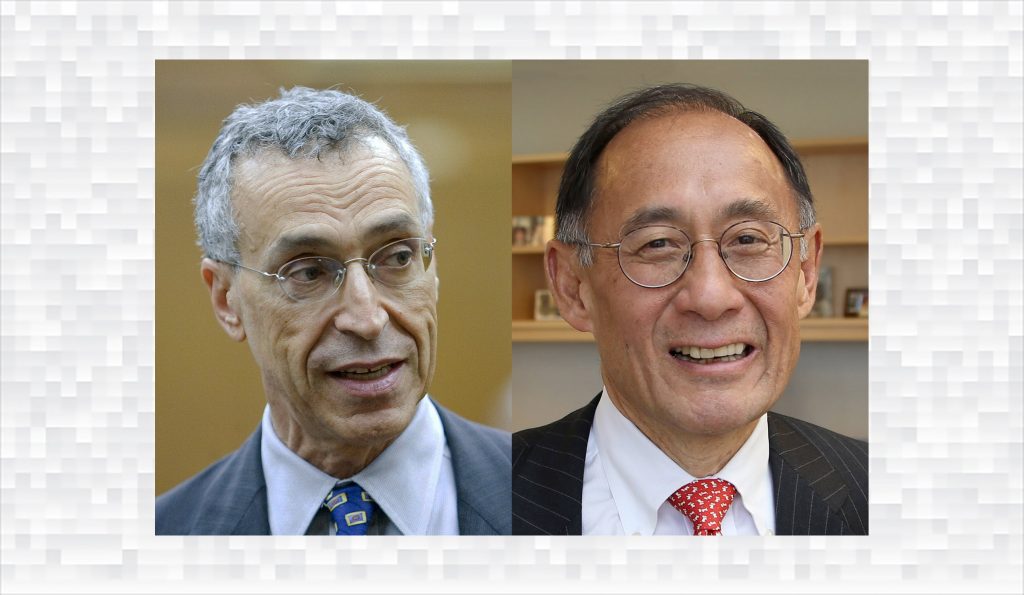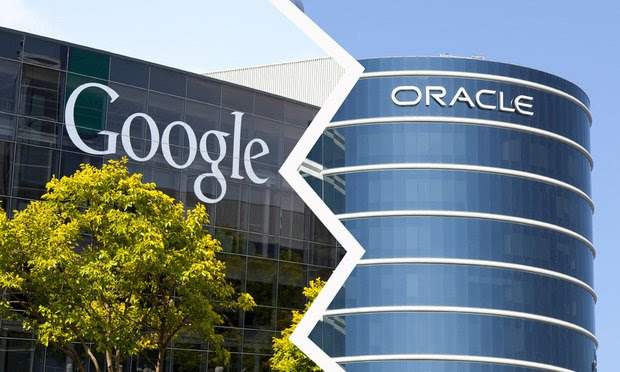Skilled in the Art: How Kirkland Landed $765M + VMWare Calls on Wilmer Appellate Honchos + Oracle Puts Google Amici on Blast
Here's how Kirkland & Ellis scored a $765 million verdict while expanding Defend Trade Secrets Act law.
February 18, 2020 at 10:00 PM
8 minute read
Welcome to Skilled in the Art. I'm Law.com IP reporter Scott Graham. I hope you all enjoyed your holiday weekends (unless you were working on TROs). Here's what's cracking as we start the new week:
• How Kirkland & Ellis scored a $765 million verdict while expanding DTSA law.
• VMWare calls on Wilmer's Bill Lee AND Seth Waxman as it tries to dig out from a $236 million patent verdict.
• Oracle EVP takes a big swing at Google's amici curiae.
As always, you can email me your feedback and follow me on Twitter.
 Kirkland & Ellis partners, from left, Adam Alper, Brandon Brown and Michael De Vries.
Kirkland & Ellis partners, from left, Adam Alper, Brandon Brown and Michael De Vries.
Long Trial, Quick Verdict in $765 Million Win
I think of the typical IP trial as going two weeks, maybe three weeks tops. The Apple v. Samsung "trial of the century" of 2012 was only 24 days, openings to verdict.
Kirkland & Ellis and client Motorola Solutions just spent 3 ½ months trying trade secret and copyright claims against digital mobile radio competitor Hytera. And it took only 2 ½ hours for jurors to render their verdict: $764.6 million.
"The jury began deliberating at 10:00" on Friday, said Kirkland partner Adam Alper, who gave Motorola's closing argument. "They sent out a note asking for, essentially, Motorola's punitive damages number. And as soon as they got that number, around 12:25, they came back with a verdict at 12:30."
The damages cover Hytera sales worldwide. In what Kirkland describes as a first, U.S. District Judge Charles Norgle of Chicago ruled that the Defend Trade Secrets Act (DTSA) applies extra-territorially, so long as there's some nexus to misconduct in the United States. "And we have that in spades," said Kirkland partner Michael De Vries, another member of the trial team.
Norgle has scheduled a hearing Friday on Motorola's application for a TRO enjoining all worldwide sales of infringing Hytera products pending a permanent injunction. Down the road, Motorola will also be looking for attorneys fees and an accounting for damages up to trial.
Chicago-based Motorola had accused four former engineers of downloading confidential documents, including proprietary source code for digital mobile radios, before joining Hytera between 2008 and 2010. Shenzhen, China-based Hytera argued that Motorola waited too long to act on its suspicions.
It took a few years because Hytera carefully schemed to cover its tracks, the Kirkland lawyers said Tuesday. The company made just enough tweaks to the stolen source code to throw off investigators examining their products, partner Brandon Brown said. "You have Hytera documents laying out the plan, where they literally talk about the tests that Motorola will run to see if there's been source code theft," Brown said. "Then you look at the Motorola side of things, and you see they ran that exact test and it failed because Hytera had taken steps to fool the test."
Alper attributed the verdict to not only the breadth of Hytera's theft and its profits, but also the unapologetic manner in which it presented its case. "We had told the jury, you just can't let the message go out to the world that that's OK," Alper said.
Over the weekend, Hytera posted a statement on its corporate site saying it respectfully disagrees with the verdict and intends to appeal. "Hytera has enhanced its corporate governance and added new policies and procedures related to intellectual property and the onboarding of new employees," the statement says. "In addition, Hytera is engaged in an ongoing process of removing the affected source code from the products at issue and has been rolling out updated software to the marketplace."
De Vries said he appreciates the acknowledgment that impropriety occurred. "Of course, what we alleged and what the jury found is far worse" than improper training of employees, he said. "We put on evidence that confirmed that the corporation engaged in what the jury found to be willful and malicious conduct warranting punitive damages."
So how did the trial team celebrate the holiday weekend following this behemoth trial? Alper and De Vries are based on the West Coast, so they got to fly home and spend some time with their families. But that wasn't all. "We all got to write an application for a temporary restraining order," De Vries cracked.
 Wilmer partners Seth Waxman, left, and Bill Lee.
Wilmer partners Seth Waxman, left, and Bill Lee.
Who Got the Work?
➤ Cirba v. VMWare VMWare has called on Wilmer Cutler Pickering Hale and Dorr to try to dig it out from a $236 million patent infringement verdict in Delaware federal court. Wilmer appellate honchos Bill Lee, Seth Waxman and Thomas Saunders entered their appearances in Cirba v. VMWare on Wednesday.
VMWare, which was represented by Morrison & Foerster at trial, is facing an uphill battle. U.S. District Judge Leonard Stark, who presided over the trial, set out his tentative views on post-trial motions Feb. 10, saying "I expect it is unlikely I am going to be persuaded by VMWare to alter the verdict."
➤ Sonos v. Google Google has chosen Quinn Emanuel Urquhart & Sullivan to defend patent infringement allegations by home audio company Sonos, at least at the International Trade Commission. Quinn partners S. Alex Lasher, Marissa Ducca, Jared Newton, Charles Verhoeven, Sean Pak, Justin Griffin and Lance Yang noticed their appearances for Google and parent Alphabet last week. Sonos is represented by Orrick, Herrington & Sutcliffe and others.
➤ SMTM v. Apple Apple is calling on Goldman Ismail Tomaselli Brennan & Baum to defend patent infringement allegations over the "Do Not Disturb" feature on Apple mobile devices. Backed by Cotchett Pitre & McCarthy and others, inventor and Bay Area restaurateur Nick Bovis says he patented an app for preventing distracted driving in 2015, two years before Apple rolled out Do Not Disturb.
A Goldman Ismail team featuring partners Kenneth Baum, Mike Pieja, Alan Littmann, Doug Winnard and Lauren Abendshien answered for Apple last month, arguing that Nokia had the idea before Bovis did.

Oracle Exec Rips Microsoft, IBM, CCIA for Supporting Google
It sounds as if Oracle might be feeling a little amicus envy at the Supreme Court.
An Oracle newsroom blog post under Executive Vice President Ken Glueck's name insinuates—no, make that comes right out and charges—that Google has bought some of its tech industry amici, while accusing others of switching sides out of naked self-interest.
Even by the acrimonious standards of Google v. Oracle, which will be heard March 24 at the Supreme Court, Glueck's attacks are notable.
His argument is that the tech industry isn't really supporting Google, even though Microsoft, IBM and the Computer and Communications Industry Association (CCIA) have submitted amicus briefs in support.
Microsoft is "the original sinner" when it comes to Java, Glueck writes, referring to the DOJ antitrust action against Microsoft in the 1990s, which included anticompetitive conduct toward Java (then owned by Sun Microsystems). Microsoft filed an amicus supporting Oracle's side in 2013 before the Federal Circuit, but then in 2015, it struck a peace deal with Google on IP. "What changed Microsoft's stance in this litigation was that commercial agreement," Glueck writes. "Microsoft's position is as principled as that."
IBM also tried to get its hands on Java in 2009, but Sun eventually chose to be acquired by Oracle. IBM has been silent each time the case was before the Federal Circuit, but now—having just completed its $34 billion acquisition of Red Hat, "IBM really wants its own, non-compatible version of Java for its own commercial purposes," Glueck writes.
Finally, there's the bordering-on-bizarre thrashing of CCIA, an organization Glueck says "sets a whole new standard for transactional advocacy" and is "completely beholden to Google, financially and otherwise." That's in part because Microsoft paid off one of its former executives, according to Glueck. I don't follow the logic, but Glueck insists that as a former CCIA board he knows whereof he speaks.
CCIA president Matt Schruers had this response in a written statement: "CCIA's pro-interoperability fair use stance has remained constant since the 1990s, when it was developed with Oracle's support, as a CCIA member. It is regrettable that what was once a mutual position has now become inconvenient for the company."
In any event, Glueck says in his blog post, "there is no outpouring of support" from the tech community for Google.
So far, there's not much outpouring for Oracle, either, though amici have until tomorrow to submit their briefs. To date the highlight is from the Internet Accountability Project (IAP), a conservative think tank formed last fall to basically rain shit on Google, Amazon and Facebook.
Authoring IAP's brief is Kellogg, Hansen, Todd, Figel, & Frederick partner John Thorne. As recently as last year Thorne was general counsel for the High Tech Inventors Alliance, which includes Google, Amazon and Oracle.
Thorne and IAP trace the history of fair use law back to Justice Joseph Story, arguing that Google's copying of Java declaring code cannot be fair as a matter of law because it replaced Oracle's use in the marketplace.
That's all from Skilled in the Art today. I'll see you all again on Friday.
This content has been archived. It is available through our partners, LexisNexis® and Bloomberg Law.
To view this content, please continue to their sites.
Not a Lexis Subscriber?
Subscribe Now
Not a Bloomberg Law Subscriber?
Subscribe Now
NOT FOR REPRINT
© 2025 ALM Global, LLC, All Rights Reserved. Request academic re-use from www.copyright.com. All other uses, submit a request to [email protected]. For more information visit Asset & Logo Licensing.
You Might Like
View All
Skilled in the Art With Scott Graham: I'm So Glad We Had This Time Together

Design Patent Appeal Splinters Federal Circuit Panel + Susman Scores $163M Jury Verdict + Finnegan Protects Under Armour's House
Law Firms Mentioned
Trending Stories
- 1Big Law Firms Sheppard Mullin, Morgan Lewis and Baker Botts Add Partners in Houston
- 2Lack of Jurisdiction Dooms Child Sex Abuse Claim Against Archdiocese of Philadelphia, says NJ Supreme Court
- 3DC Lawsuits Seek to Prevent Mass Firings and Public Naming of FBI Agents
- 4Growth of California Firms Exceeded Expectations, Survey of Managing Partners Says
- 5Blank Rome Adds Life Sciences Trio From Reed Smith
Who Got The Work
J. Brugh Lower of Gibbons has entered an appearance for industrial equipment supplier Devco Corporation in a pending trademark infringement lawsuit. The suit, accusing the defendant of selling knock-off Graco products, was filed Dec. 18 in New Jersey District Court by Rivkin Radler on behalf of Graco Inc. and Graco Minnesota. The case, assigned to U.S. District Judge Zahid N. Quraishi, is 3:24-cv-11294, Graco Inc. et al v. Devco Corporation.
Who Got The Work
Rebecca Maller-Stein and Kent A. Yalowitz of Arnold & Porter Kaye Scholer have entered their appearances for Hanaco Venture Capital and its executives, Lior Prosor and David Frankel, in a pending securities lawsuit. The action, filed on Dec. 24 in New York Southern District Court by Zell, Aron & Co. on behalf of Goldeneye Advisors, accuses the defendants of negligently and fraudulently managing the plaintiff's $1 million investment. The case, assigned to U.S. District Judge Vernon S. Broderick, is 1:24-cv-09918, Goldeneye Advisors, LLC v. Hanaco Venture Capital, Ltd. et al.
Who Got The Work
Attorneys from A&O Shearman has stepped in as defense counsel for Toronto-Dominion Bank and other defendants in a pending securities class action. The suit, filed Dec. 11 in New York Southern District Court by Bleichmar Fonti & Auld, accuses the defendants of concealing the bank's 'pervasive' deficiencies in regards to its compliance with the Bank Secrecy Act and the quality of its anti-money laundering controls. The case, assigned to U.S. District Judge Arun Subramanian, is 1:24-cv-09445, Gonzalez v. The Toronto-Dominion Bank et al.
Who Got The Work
Crown Castle International, a Pennsylvania company providing shared communications infrastructure, has turned to Luke D. Wolf of Gordon Rees Scully Mansukhani to fend off a pending breach-of-contract lawsuit. The court action, filed Nov. 25 in Michigan Eastern District Court by Hooper Hathaway PC on behalf of The Town Residences LLC, accuses Crown Castle of failing to transfer approximately $30,000 in utility payments from T-Mobile in breach of a roof-top lease and assignment agreement. The case, assigned to U.S. District Judge Susan K. Declercq, is 2:24-cv-13131, The Town Residences LLC v. T-Mobile US, Inc. et al.
Who Got The Work
Wilfred P. Coronato and Daniel M. Schwartz of McCarter & English have stepped in as defense counsel to Electrolux Home Products Inc. in a pending product liability lawsuit. The court action, filed Nov. 26 in New York Eastern District Court by Poulos Lopiccolo PC and Nagel Rice LLP on behalf of David Stern, alleges that the defendant's refrigerators’ drawers and shelving repeatedly break and fall apart within months after purchase. The case, assigned to U.S. District Judge Joan M. Azrack, is 2:24-cv-08204, Stern v. Electrolux Home Products, Inc.
Featured Firms
Law Offices of Gary Martin Hays & Associates, P.C.
(470) 294-1674
Law Offices of Mark E. Salomone
(857) 444-6468
Smith & Hassler
(713) 739-1250










